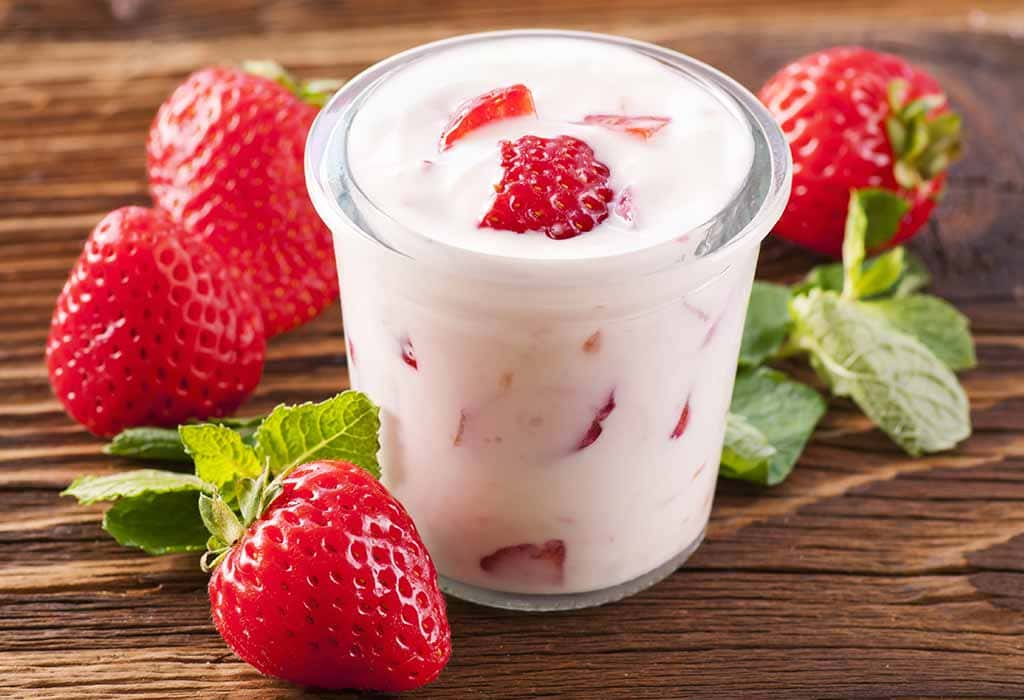Whether in the morning for breakfast or as a low-carb dinner – yoghurt is popular. But what exactly is in it? Are all yogurts probiotic? And can vegans also eat yoghurt without hesitation? We clarify the most important questions and myths about the popular dairy product.
We all know the commercials in which children with a beaming smile spoon out a yoghurt pot or women happily put a spoonful of milk product in their mouth. But is yoghurt really as healthy as the advertising suggests?
Healthy or not – what is yoghurt made of?
First of all, we should distinguish between natural yoghurt and fruit yoghurt – the latter usually contains a lot of sugar and artificial flavors. If you like sweet yoghurt, you can simply chop fresh fruit into a natural yoghurt as a healthier alternative to fruit yoghurt – or sweeten it with a dollop of (strawberry) jam or honey.
But whether fruity or natural: What is yoghurt actually made of? The most important are milk and lactic acid bacteria. The bacterial cultures convert milk sugar (lactose) into more digestible lactic acid. This fermentation gives yoghurt its firm consistency and its typical, slightly sour taste.
Yoghurt: The more fat, the creamier
Yoghurt provides our body with two important substances: protein and calcium. Like other dairy products (e.g. quark or skyr), valuable proteins for muscle building are in yoghurt. The high calcium content supports bone health.
You can buy yoghurt with different fat contents: the higher the fat content, the creamier the yoghurt usually is. The saturated fatty acids in yoghurt are important for energy balance, but eating too much can increase the risk of cardiovascular disease and cholesterol levels. If you want to save calories, it is best to use a reduced-fat yoghurt variant with 1.5 percent fat. Also read: Lose weight properly: What diets actually bring – and what not
The German Society for Nutrition (DGE) recommends drinking milk every day or eating milk products such as yoghurt or cheese. As a guideline, the DGE gives 200 to 250 g of milk and milk products per day.
Is yoghurt good for the intestinal flora?
The bacteria in yoghurt stimulate digestion and help the intestines to work. However, the intestinal flora differs from person to person and is influenced by diet, among other things.
Yoghurt for lactose intolerance?
Not all dairy products contain the same amount of milk sugar (lactose). The lactic acid bacteria in yoghurt, for example, convert the lactose into compatible lactic acid. People with lactose intolerance do not necessarily have to do without the creamy dairy product. Sour milk products such as yoghurt or kefir are often tolerated if they have not been heat treated. If you’re not sure how well yogurt works for you, it’s best to try it in small amounts.
Lactose-free yoghurts or vegan yoghurts serve as an alternative. Such plant-based yoghurts based on oats, soy, coconut, almonds or lupine have mostly done well. In some products, however, we complain about problematic additives.
Better probiotic yogurt or not?
A so-called probiotic yoghurt is characterized by a high content of germs, which are not killed by the stomach acid, but should arrive alive in the large intestine. There, the microorganisms are supposed to have positive effects – for example, suppress other unwanted germs and ensure better digestion.
In our last test of probiotic yoghurts, we found that special probiotic yoghurts are not required for a healthy and balanced diet. Ordinary natural yoghurts that are not declared as probiotic can also have the corresponding germs.
If you still want to use probiotic yoghurts, you should note the following: The number of probiotic germs decreases over time. Therefore, you should buy the products as fresh as possible and not several weeks in advance. Also pay attention to the sugar content: this is often higher in probiotic yoghurt than in natural yoghurt.



